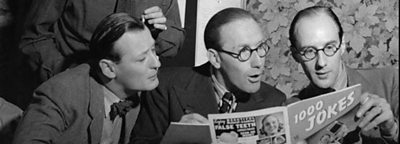Richard Murdoch, Arthur Askey and Vernon Harris in 'Band Waggon' (1939).
The 大象传媒 adapts to wartime broadcasting
When, on Sunday 3 September 1939, Prime Minister Neville Chamberlain announced that Britain was at war with Germany, it came as no surprise to listeners. Three days earlier the television service had closed down in readiness, and all the 大象传媒's regional services had been amalgamated into a single station - the Home Service - for the whole country.
Closing down regional services was in part a security measure. An identifiable service from a regional transmitter would act as a beacon for the incoming Luftwaffe. But it was also to facilitate communication. A single, flexible service that could be interrupted for essential bulletins and public announcements would be easier to manage.
The trouble was nobody liked it. "Interruptible" light music made for dull radio - particularly at the start of the war, when there was no British battlefront and not much to report. Listeners and the press complained of "too many organ recitals" and "too many public announcements".
The 大象传媒 responded by carrying out research into the needs and wishes of listeners in their new circumstances. The views of soldiers were also taken into account - Frederick Ogilvie, Director-General of the 大象传媒 at the time, even visited troops in France to hear what they had to say - and themes began to emerge. Everyone wanted to be connected to their loved ones, and in between, they wanted quality entertainment.
In time, they would have other needs. When resources were scarce and food in short supply, the 大象传媒 had a key role in supporting the war effort with programmes of practical value to ordinary citizens, and there would be special programmes to provide education for the many thousands of children evacuated from the cities.
Connecting loved-ones
Basil Nicholls, the controller of programmes, hated what he saw as the 'insincere and over-sentimental performances of women singers' like Vera Lynn. Similarly, the 大象传媒 Governors' minutes 'deplored' her show, Sincerely Yours.
But what did they know? The troops loved it, and they loved her. Sincerely Yours, presented in the form of a letter to the boys on the fighting front, attracted 2,000 requests a week, and Vera's voice (sincere or not) plucked at the heartstrings in songs such as 'We'll Meet Again' and 'White Cliffs of Dover'.
Over To You was another programme designed to link people at home and abroad. Jane Welsh would tour the country, recording messages from nearest and dearest and relaying them to RAF personnel who were training in Canada .
Entertainment
Arthur Askey told Band Waggon listeners: "I think it's a stroke of genius, putting Band Waggon on the air. It'll make old Nasty realise what the British public will put up with."
But it turned out that Band Waggon and a host of similar shows were more than what people would put up with - they were just what the audience wanted. Under siege, the nation needed light relief. At the start of the war, many found entertainment value in the Haw-Haw broadcasts from Radio Hamburg, and the authorities looked to the 大象传媒 to respond.
The result was a golden era for 大象传媒 variety. It's That Man Again (later abbreviated to ITMA) was an even bigger hit than Band Waggon. It starred Tommy Handley as the Minister of Aggravation and Mysteries, in a parody of the Ministry of Information, and it was packed with corny lines like: "I go all goosey when I can't follow my proper-gander."
The 大象传媒 signed up the Variety Repertory Company to meet the demand, and they were kept busy. In two months Maurice Denham played 225 parts in 100 shows, many targeting the enemy in skits such as 'Adolf in Blunderland' and 'The Man Who Looks Like Charlie Chaplin'.
As ever, the 大象传媒 trod a difficult path. There were some who felt that the Nazis weren't as bad as they were being painted, prompting Noel Coward to pen a subtle repost in his song 'Don't Let's Be Beastly to the Germans'. But it was too subtle for many, who complained that the 大象传媒 was going soft on the Germans. And more variety meant more jokes - and that meant more comics sailing close to the wind.
It provoked a campaign by former governor Lady Snowden to eliminate vulgarity. But the 大象传媒 conducted its own review of the output, and whatever anyone thought about the jokes, there was no getting away from their popularity. An internal document declared: "The new audience must be retained as a matter of policy."
A terrible air raid forced a Sunday religious programme out of the main studio in Bristol and into a small emergency studio. There was no room for the orchestra, so presenter Stuart Hibbert crouched under a table with the microphone and read from the Bible while Paul Beard played the violin on his knees.
